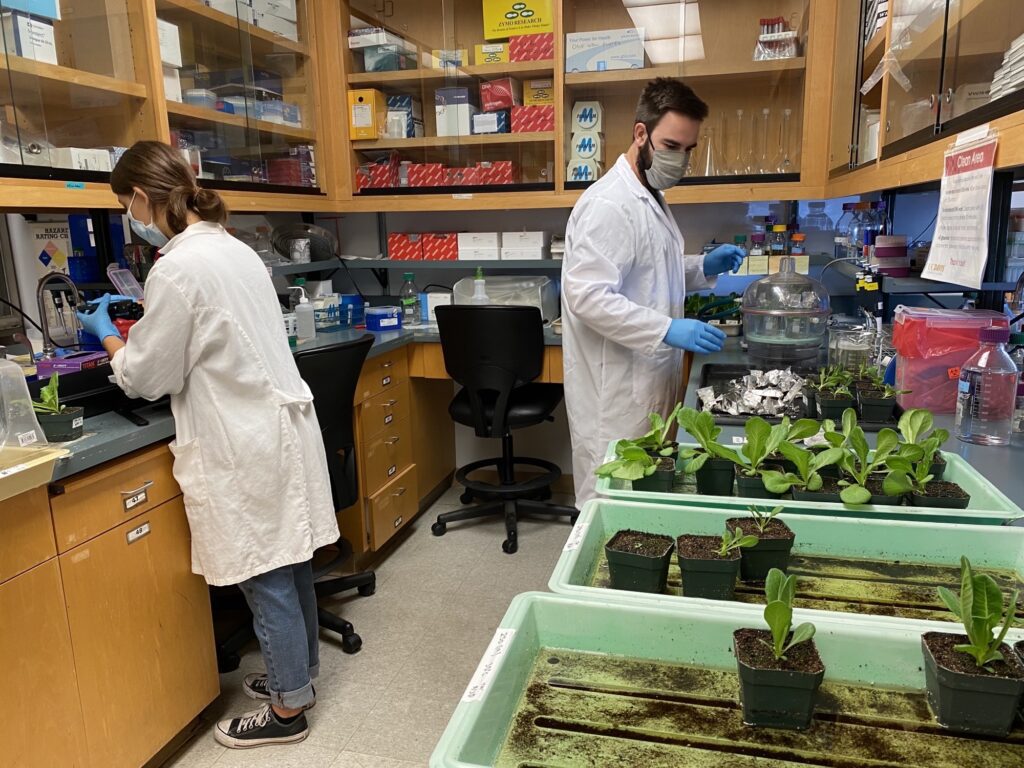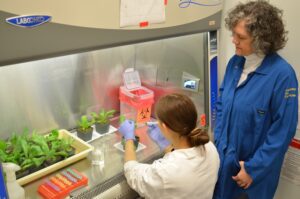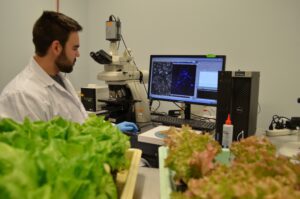
Apr 3, 2023Scientists study lettuce that resists E. coli
Researchers at the University of California-Davis are working to identify strains of lettuce that can resist bacteria like E. coli.
The research, led by Maeli Melotto, associate professor in the UC-Davis College of Agricultural and Environmental Science, is paving the way toward breeding for enhanced safety of leafy greens. Active breeding efforts are expected to follow, she said.

“The idea is to improve the germplasm and breeding lines that lack the ‘susceptibility’ genes,’” Melotto said.
By identifying plant genes that make lettuce more susceptible to bacteria, scientists can engineer plants to remove those genes.
Starving the bacteria
Melotto’s research has identified a gene that could participate in the plant’s susceptibility to E. coli.
“We can select for lettuce types that ‘starve’ the bacteria, so that they will not survive long on the lettuce leaves,” she said.
Data gleaned from the long-term project is being analyzed as researchers continue searching for susceptibility genes.
Melotto studies the molecular and genetic mechanisms of plant immunity against pathogens and virulence strategies employed by bacteria to overcome plant defenses, allowing them to infect leaves.
The materials can be used to select more resistant lettuce cultivars, she said. The research also provides scientists basic knowledge of plant-microbe interactions at the molecular level. Geneticists and breeders can use this knowledge to improve crops, Melotto said.
Not all lettuce cultivars are resistant to all bacteria that cause foodborne illnesses, Melotto said. Additionally, the environment influences the bacterial persistence in leaves.
Researchers use Arabidopsis, a small flowering plant in the mustard (Brassicaceae) family, which includes cabbage and radishes, as a model plant. The scientists also use tomatoes for modeling and are collaborating with other researchers studying citrus and sugarcane.
Other applications
The UC-Davis scientists use lettuce because many genetic resources are available for the crop, as well as the safety concern. However, the scientific discoveries can be applied to other leafy vegetables.
“Spinach and other vegetables have also been associated with disease outbreaks,” Melotto said. “Similar research could be conducted with these crops; however, funding to study and test these crops has been limited. Thus, we prioritize our efforts to study lettuce due to its economic impact.”
Lettuce “sweats” substances onto the surface of leaves that E. coli and other bacteria consume. The bacteria can reside just below the surface of lettuce leaves. In another study, Melotto and other researchers are examining how bacteria lives in those tiny spaces by studying the natural chemicals that occupy the crevices and the compounds lettuce releases onto those surfaces.

“Some lettuce types release nutrients that can feed the bacteria, allowing them to grow on the leaf surface and inside the leaves,” Melotto said. “These are the spaces where the bacterial cells live and escape from sanitation. We are trying to identify plant metabolites that support bacterial growth. Identifying these nutrients is important to understand why some lettuce types are more prone to bacterial contamination than others.”
Tony Alameda, of Top Flavor Farms in San Juan Bautista, California, is an advisory board member of the California Leafy Green Marketing Agreement (LGMA).
“If something like what she’s developing or talking about proves somewhat resistant, this could be a complete game changer,” Alameda said. “I can’t describe how much benefit would be derived by that type of advance. Could food safety come genetically through the plants? I don’t think anyone envisioned that would be something that could be solved from a food safety standpoint from genetic modification of the plant.”
Through the LGMA, the overwhelming majority of leafy greens growers in California have adopted measures to address outbreaks, from increasing buffer zones around fields to enacting guidelines for irrigating crops.
“We’re all trying to buffer away, trying to stay away from the problem, making sure we’re testing, sampling our way away from outbreaks, better than we were. To bring confidence to our consumers and to have these types of advanced technology would be tremendous development for the industry and for consumers and for society.”
Melotto’s long-term goals include dissecting the molecular and biological functions of plant proteins and bacterium factors that determine the outcome of the plant pathosystem, that is, their resistance/susceptibility to bacterial infections, and to discover strategies used by human pathogens to survive in lettuce and other plants.
“I hope that this research can help improve lettuce and, in the future, breeders can release new cultivars that are less prone to bacterial contamination,” Melotto said.
Earlier this year, Melotto presented her findings at California Specialty Crops Council and California Leafy Greens Research Board (CLGRB) meetings. Grants from the U.S. Department of Agriculture’s National Institute of Food and Agriculture and the CLGRB partly fund the research.
— Doug Ohlemeier, assistant editor
Top photo: Lab student researchers Tracy Weitz and Joseph Student research strains of lettuce that can resist bacteria like E. coli better than others. Photos: University of California-Davis
Second photo: UC-Davis lab student Tracy Weitz, left, and Maeli Melotto, associate professor, demonstrate lettuce inoculation with pathogenic bacteria.
Bottom photo: Joseph Student, a UC-Davis graduate student, views contaminated tissue via a microscope.
















